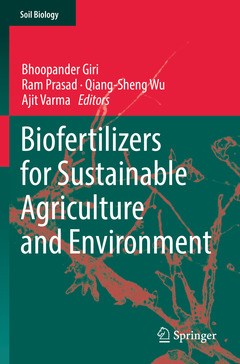Biofertilizers for Sustainable Agriculture and Environment, 1st ed. 2019 Soil Biology Series, Vol. 55
Coordonnateurs : Giri Bhoopander, Prasad Ram, Wu Qiang-Sheng, Varma Ajit

This book provides a comprehensive overview of the benefits of biofertilizers as an alternative to chemical fertilizers and pesticides.
Agricultural production has increased massively over the last century due to increased use of chemical fertilizers and pesticides, but these gains have come at a price. The chemicals are not only expensive; they also reduce microbial activity in agricultural soils and accumulate in the food chain, with potentially harmful effects for humans. Accordingly, it is high time to explore alternatives and to find solutions to overcome our increasing dependence on these chemicals.
Biofertilizers, which consist of plant remains, organic matter and microorganisms, might offer an alternative. They are natural, organic, biodegradable, eco-friendly and cost-effective. Further, the microbes present in the biofertilizers are important, because they produce nutrients required for plant growth (e.g., nitrogen, phosphorus, potassium), as well as substances essential for plant growth and development (e.g., auxins and cytokinins). Biofertilizers also improve the physical properties, fertility and productivity of soil, reducing the need for chemical fertilizers while maintaining high crop yield. This makes biofertilizers a powerful tool for sustainable agriculture and a sustainable environment.
The book covers the latest research on biofertilizers, ranging from beneficial fungal, bacterial and algal inoculants; to microbes for bioremediation, wastewater treatment; and recycling of biodegradable municipal, agricultural and industrial waste; as well as biocontrol agents and bio-pesticides. As such, it offers a valuable resource for researchers, academics and students in the broad fields of microbiology and agriculture.
1. Microbial Biofertilizers: Types and Applications.- 2. Fungal Inoculants for Native Phosphorus Mobilization.- 3. Potential Applications of Algae-based Biofertilizer.- 4. Ectomycorrhizal Fungi: Role as Biofertilizers in Forestry.- 5. Perspectives on the Role of Arbuscular Mycorrhizal Fungi in the in-vivo Vegetative Plant Propagation.- 6. Silicon (Si) and Zinc (Zn) Solubilizing Microorganisms: Role in Sustainable Agriculture.- 7. Status and prospects of bacterial inoculants for sustainable management of agroecosystems.- 8. Plant Nutrient Management Through Inoculation of Zinc Solubilizing Bacteria for Sustainable Agriculture.- 9. Endophytic Bacteria as A Modern Tool for Sustainable Crop Management Under Stress.- 10. Biofertilizers in Argentina.- 11. Rhizobial Inoculants for Sustainable Agriculture: Prospects and Applications.- 12. Biofertilizer and their role in sustainable agriculture.- 13. The use of Microorganisms for the Biodegradation of Sewage Sludge and the Productionof Biocompost for Sustainable Agriculture.- 14. Circadian Rhythms in Plant Microbe Interaction: For Better Performance of Bioinoculants in the Agricultural Fields.- 15. The Actinobacteria and Their Role as Plant Probiotics.- 16. Organic Fertilizer from Algae: A Novel Approach Towards Sustainable Agriculture.- 17. Phosphate Solubilizing Fungi and Their Potential Role in Sustainable Agriculture.- 18. Fungi as Biological Control Agents.- 19. Biocontrol Agents: Potential of Biopesticides for Integrated Pest Management.- 20. Microbial-Mediated Plant Growth Promotion: A Mechanistic Overview on Cultivable Plant Growth Promoting Members.- 21. Mycorrhizas and Tolerance of Abiotic Stress in Citrus Plants.- 22. Arbuscular Mycorrhizal Fungi (AMF) from Heavy Metal Contaminated Soils: Molecular Approach and Application in Phytoremediation.- 23. The Role of Arbuscular Mycorrhiza in Sustainable Environment and Agriculture.- 24. Microbe-Mediated Removal of Heavy Metals for Sustainable Agricultural Practices.
Dr. Bhoopander Giri: Received his Ph.D in Mycorrhizal Research from the Department of Botany, University of Delhi in 2001. Dr Giri has worked as a post-doctoral fellow at the Department of Plant Pathology, North Carolina State University, USA and is currently working as an Assistant Professor at the Department of Botany, Swami Shraddhanand College, University of Delhi, Delhi. He is a recipient of CSIR Research Associateship (2003), DST Young Scientist Fellowship (2005) and Raman Post-Doctoral Fellowship. He has served as a General Secretary (from 2013-2015) for International Symbiosis Society (ISS), USA. Dr. Giri is a life-member/member of many prestigious academic societies. Besides, he serves as a reviewer for several international and national journals, including Experimental and Environmental Botany, Planta, Applied Soil Ecology, Journal of Plant Growth Regulation, Agroforestry System, Colloids and Surfaces B: Biointerfaces, Scientia Horticulture, Acta Physiologia Plantarum, Spanish Journal of Agricultural Research, Journal of Experimental Botany, Institute for Life Long Learning (ILLL), University of Delhi (e-content) and UGC-CEC (pre-view subject expert). Dr. Giri has published more than 38 papers in the national and international peer-reviewed journals and books. His paper “Arbuscular mycorrhizal fungi in alleviation of salt stress” published in Annals of Botany Oxford Press, UK has been listed among TOP 10 cited publications (from 2009-2014) in the area of Biological Science and Agriculture by International Comparative Performance of India’s Research Base, Department of Science and Technology Report 2015, India. He has presented research papers in several national and international conferences (Switzerland, Canada and USA etc) and also served as organizing secretary. Dr. Giri has edited a book “Root Biology” published by Springer International Publishing AG.
Dr. Ram Prasad: Associated with Amity Institute of Microb
Date de parution : 08-2020
Ouvrage de 544 p.
15.5x23.5 cm
Date de parution : 08-2019
Ouvrage de 544 p.
15.5x23.5 cm
